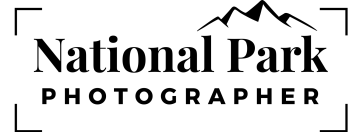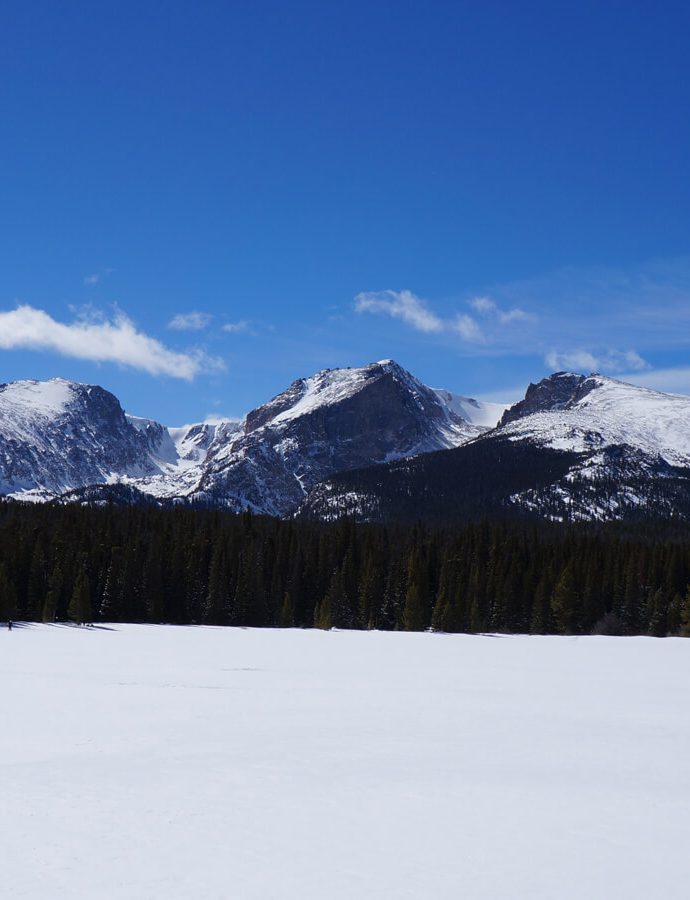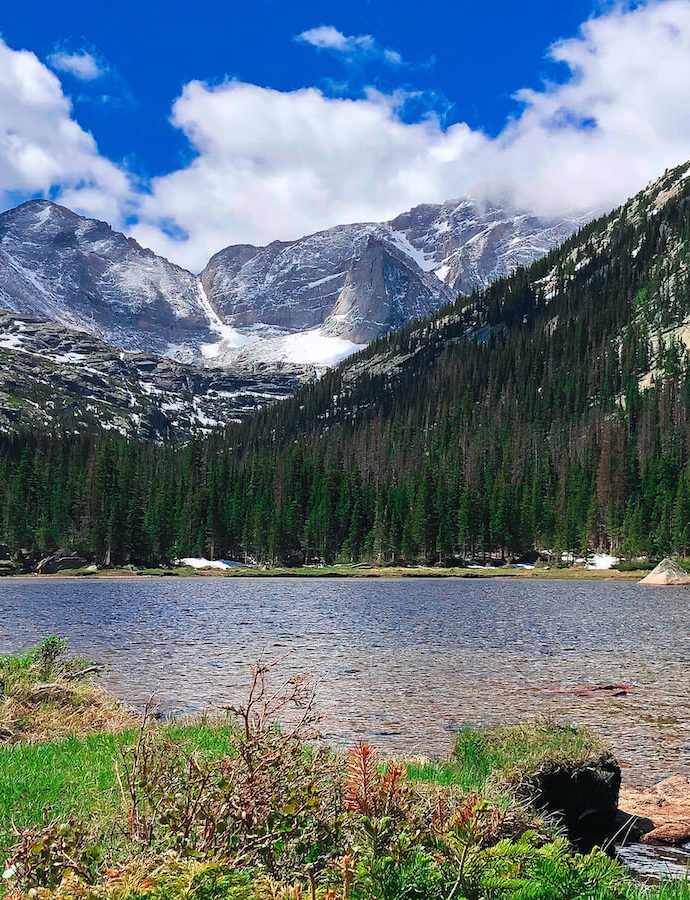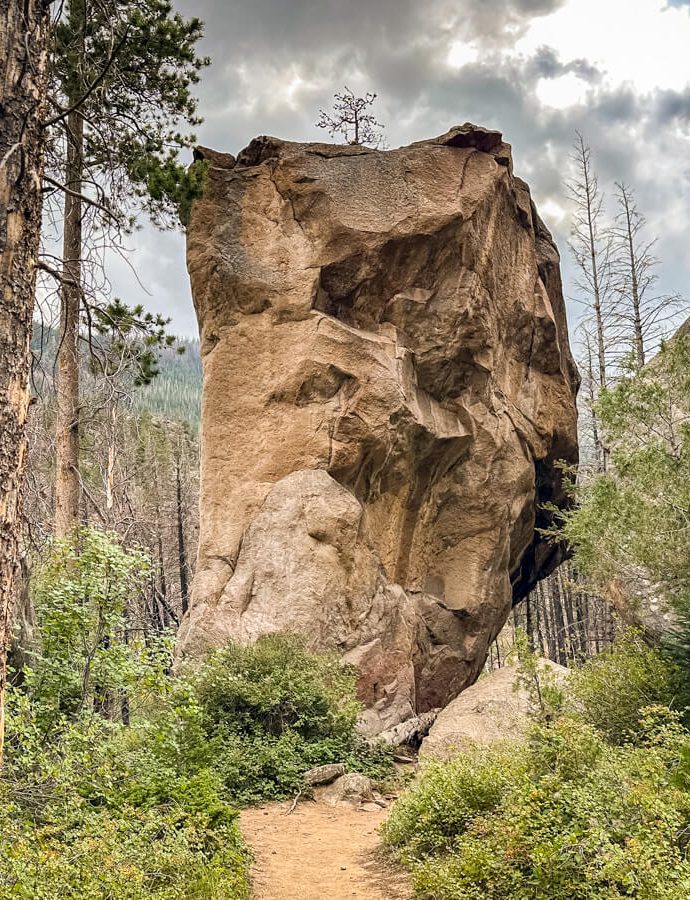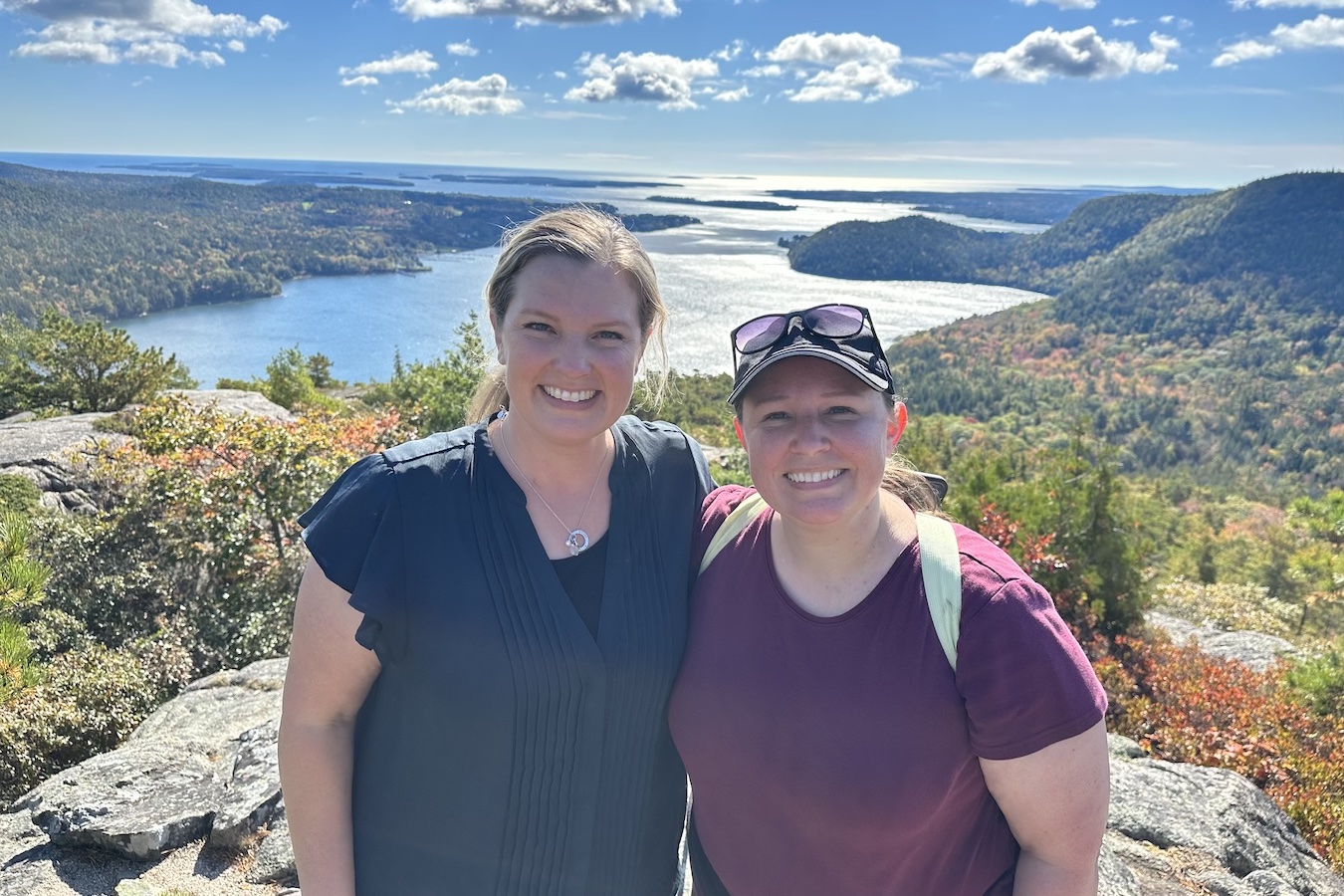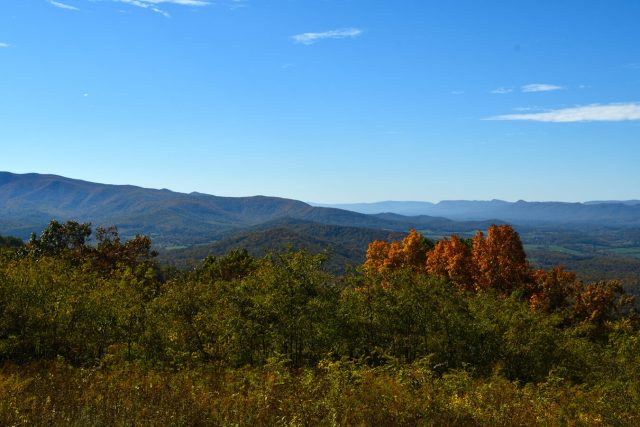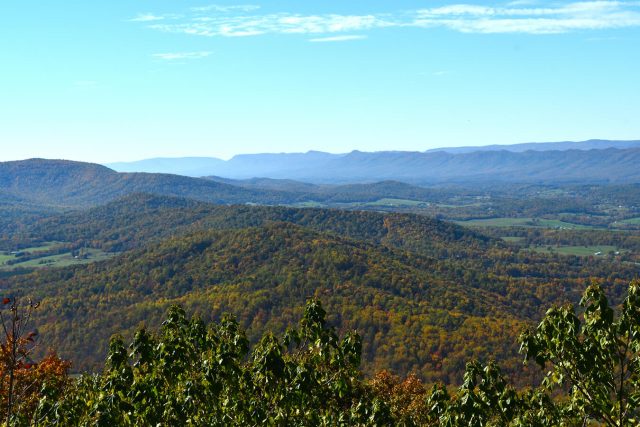Length: 9.6 mi (15.4 km)
Elevation Gain: 1480 ft (451.1 m)
Route Type: Out and Back
Difficulty: Strenuous
Black Lake, nestled at about 10,620 ft (3236.98 m) in Glacier Gorge within Rocky Mountain National Park, is a breathtaking alpine gem beneath the rugged cliffs of McHenrys Peak and the Spearhead. Its crystal-clear waters reflect towering granite peaks, while wildflower-strewn meadows and sparse subalpine firs frame its shores, home to trout and occasional wildlife like marmots. This remote lake offers a serene escape for hikers and photographers seeking solitude in the park’s wild heart, surrounded by jagged summits and alpine beauty.
Accessing Black Lake
Starting Location: Glacier Gorge Trailhead, Bear Lake Road, Estes Park, CO 80517
GPS (DD): 40.310353, -105.640380
To access the Glacier Gorge Trailhead for Black Lake in Rocky Mountain National Park, head to Bear Lake Road, approximately 8.5 mi (13.68 km) from the Beaver Meadows Entrance Station near Estes Park, CO. From the Beaver Meadows Visitor Center, drive west on US Highway 36 for about 1.3 mi (2.09 km), then turn left (south) onto Bear Lake Road. Continue for 7.2 miles (11.59 km) to the well-marked Glacier Gorge Trailhead on your left, just past the Glacier Basin Campground turnoff.
The trailhead’s small parking lot (20–25 spaces) fills quickly, so arrive early (before 8 AM) or use the park’s free summer shuttle (May to October) from the Park & Ride lot, about 1 mile away, which offers more spaces and pit toilets. Limited restrooms are available at the trailhead, but there is no water, so plan accordingly. For an additional 0.2 mi (0.32 km), you can start your hike at the Bear Lake Trailhead and head towards Alberta Falls to connect back up with the hiking trail. Be sure to check NPS for shuttle schedules and road conditions, especially in winter when the lot is not plowed.
Please note that at the time of this writing, timed entry tickets are required to enter Rocky Mountain National Park during the peak season. You can visit the NPS website for the current timed entry requirements.
Hiking Tips for Black Lake
Hiking to Black Lake in Rocky Mountain National Park is a strenuous 9.6-mile (15.45 km) round-trip adventure from the Glacier Gorge Trailhead (~9,200 ft, 2804.16 km), with ~1,700 ft (~518.16 km) of elevation gain reaching the alpine lake at ~10,620 ft (3236.98 m). You will pass Alberta Falls (0.85 mi, 1.37 km), Mills Lake (2.7 mi, 4.35 km), and Jewel Lake (4.2 mi, 6.76 km) along the way. Start early (before 7 AM) to secure parking or use the summer shuttle from the Park & Ride lot, and wear sturdy, waterproof boots for rocky, steep sections, stream crossings, and potential mud, with trekking poles essential for stability on the ascent.
Bring at least 3 liters of water per person, high-energy snacks, and layers for high-altitude weather shifts, including sudden thunderstorms, and acclimate gradually to avoid altitude sickness. The trail features stunning subalpine spruce-fir forests transitioning to alpine tundra, so watch for wildlife like pikas or elk, but maintain distance. Stay on marked paths to protect the fragile ecosystem, and check NPS for trail conditions, shuttle schedules, and altitude safety tips.
Recommended Emergency Supplies in Black Lake
Whenever you are traveling, it is always a good idea to bring extra emergency supplies. This is especially true if you will be hiking to more remote locations like Black Lake during your stay. Here are some highly recommended supplies to bring with you on your journey:
- Water
- Food
- Sun Protection (sunscreen SPF 30+, hat, sunglasses)
- Insect Repellent
- First Aid Kit
- Map (NPS trail map or offline GPS app)
- Flashlight/Headlamp (with batteries)
- Emergency Shelter (space blanket or poncho)
- Whistle/Signaling Device
- Extra Clothing
- Multi-Tool or Knife
- Additional Emergency Supplies (Click here for a complete list of our recommended photography and hiking gear)
Be Prepared for Limited Cell Service
National parks often have limited or spotty cell service so it is always helpful to have some sort of map or GPS-tracking device handy to assist with trail and road navigation. Even when you don’t think you will get lost, if the trails or roads are poorly marked, it is a possibility. Some GPS trackers, like the Garmin inReach and the Garmin inReach Mini, can also communicate your location to others. At a minimum, have a printed copy of the maps and hiking trails or download them to your phone.
Elevation Sickness
Visiting Rocky Mountain National Park, with elevations ranging from 7,500 to over 12,000 feet (2,286 – 3657.6 m), can pose risks of elevation sickness (acute mountain sickness, AMS) due to lower oxygen levels at high altitudes. Warning signs include headache, nausea, dizziness, fatigue, shortness of breath, and difficulty sleeping, typically appearing within 6–12 hours of ascent. If untreated, Severe cases may lead to dangerous conditions like high-altitude pulmonary edema or cerebral edema, marked by confusion, severe breathing issues, or loss of coordination, requiring immediate descent and medical attention.
To stay safe, acclimate gradually by spending a day or two at lower elevations (e.g., Estes Park, ~7,500 ft, 2,286 m) before tackling the strenuous hike to Black Lake (~10,620 ft, ~3236.98 m) via the Glacier Gorge Trail. Stay hydrated with at least 3 liters of water, avoid alcohol, eat high-carbohydrate meals, and ascend slowly to reduce risk, especially given the trail’s ~1,700-ft (~518.16 m) elevation gain. Monitor symptoms closely, descend immediately if they worsen, and check NPS for altitude safety tips and emergency contacts.
Best Time of Year to Visit Black Lake
The best time to visit Black Lake in Rocky Mountain National Park is late spring to early fall, specifically from May to October, with September to early October being particularly ideal. During this period, temperatures are mild (daytime highs of 45–70°F at ~10,620 feet, ~3236.98 m), and trails are generally snow-free, making the strenuous hike from the Glacier Gorge Trailhead accessible for prepared hikers. September and early October offer crisp, clear days with fewer thunderstorms compared to summer, showcasing stunning views of McHenrys Peak and the Spearhead against the lake’s clear waters.
Spring and early summer (May–June) bring vibrant wildflowers and lush alpine meadows along Glacier Creek, enhancing Black Lake’s scenic beauty for photography. Late spring and early fall see fewer hikers than peak summer (July–August), providing a quieter experience at this remote alpine destination. Snow can linger into June, and late fall (November) may bring icy patches, requiring snowshoes or traction devices for safety. (I love my Kahtoola ExoSpikes!) Check NPS for trail conditions, shuttle schedules, and weather updates, as high-altitude conditions can vary rapidly.
Photography Tips for Black Lake
Capturing the dramatic beauty of Black Lake in Rocky Mountain National Park requires careful timing and technique to highlight its clear waters reflecting McHenrys Peak and the Spearhead. Visit at sunrise or late afternoon for soft, golden light that enhances the alpine scenery and minimizes harsh shadows, ideal for showcasing the surrounding subalpine firs and rocky cliffs. A wide-angle lens (16–35mm) is perfect for framing the lake with its towering peaks, while a polarizing filter sharpens water reflections and sky contrast.
Use a sturdy tripod for long-exposure shots (1–2 seconds) to create smooth water effects or capture alpine glow, and include wildflowers or boulders along the shore for depth. Stay on designated trails to protect the fragile alpine ecosystem, and prepare for high-altitude weather shifts with protective gear for your camera.
Closing Remarks
Visiting Black Lake in Rocky Mountain National Park is a breathtaking journey to a remote alpine sanctuary, where crystal-clear waters mirror the jagged peaks of McHenrys Peak and the Spearhead, framed by sparse subalpine firs and vibrant wildflower meadows. Whether you’re capturing the rugged beauty with your camera, soaking in the serene solitude, spotting marmots along the rocky shores, or hiking through the dramatic Glacier Gorge, this high-altitude lake delivers an unforgettable adventure into the heart of the Rockies’ untamed wilderness.
Find Your Favorite Location
No matter where you go in Rocky Mountain National Park, be sure to take your time and find your favorite location along the way. If you are lucky, you may even spot some wildlife! Don’t forget to add detailed macro shots, change your perspective, and most importantly have fun.
Before making your trip, consider checking the official Rocky Mountain National Park website or contacting the park’s visitor center for the most up-to-date information on trail conditions, accessibility, and any recent changes. As with any visit to a national park, it’s important to follow park regulations, practice “Leave No Trace” principles, and prioritize safety while exploring this beautiful area. I hope you enjoy your time photographing Black Lake!
Joyful Journeys!
Bonnie, Co-Owner, National Park Photographer
Want to learn more about Rocky Mountain National Park? Check out these maps, guides & books:
- Rocky Mountain National Park (National Geographic Trails Illustrated Map)
- Rocky Mountain National Park: The Complete Guide: (Color Travel Guide)
- Rocky Mountain National Park: The First 100 Years
- Mystery In Rocky Mountain National Park (National Park Mystery Series)
- Best Easy Day Hikes Rocky Mountain National Park (Best Easy Day Hikes Series)
- Death in Rocky Mountain National Park (Death in the Parks)
- It Happened In Rocky Mountain National Park: Stories of Events and People that Shaped a National Park (It Happened In Series)
Please note, by making purchases through our affiliate links, you are supporting our mission to celebrate and showcase our National Parks and the photographers who frequent them. As an Amazon Associate, National Park Photographer earns from qualifying purchases at not cost to you. We appreciate your support.
